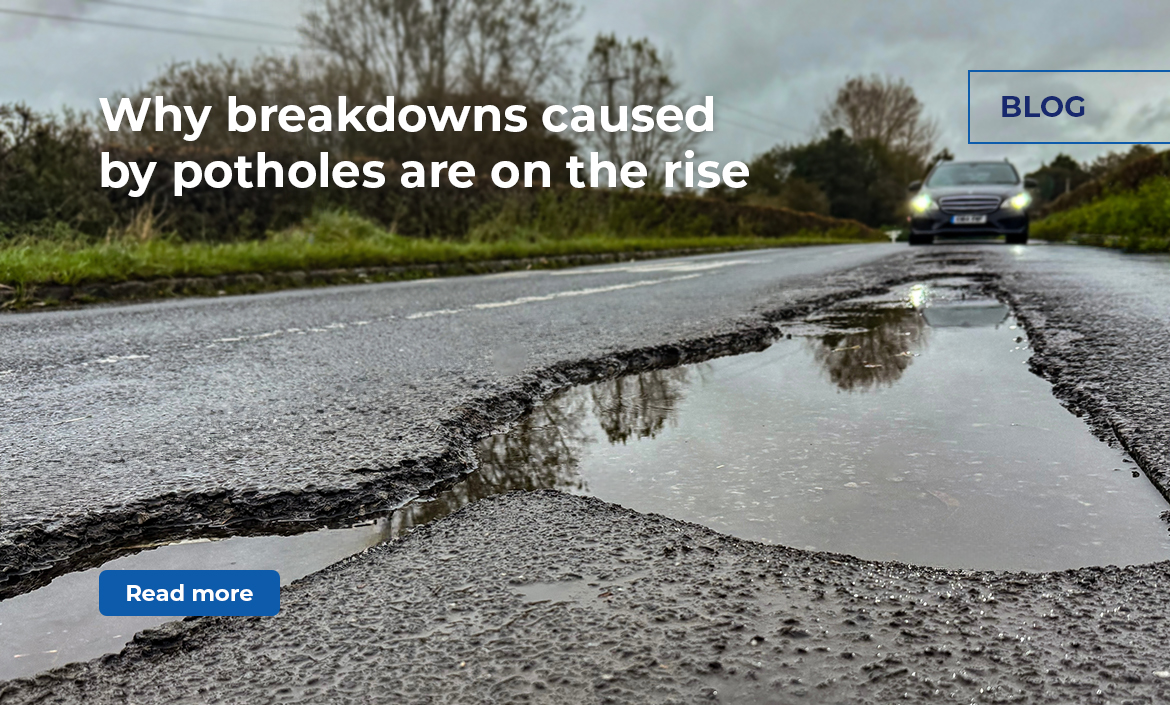New analysis from the RAC has revealed that pothole-related breakdowns have doubled in the first quarter of 2025 compared to the previous three months. For fleet managers, this signals not just an uptick in vehicle damage, but a growing risk to operational costs, driver safety, and service continuity.
A rough start to the year
Between January and March 2025, 9,439 breakdowns were attended by the RAC as a direct result of poor road surfaces. That figure marks a 1.5% share of all RAC callouts, a notable jump from 0.8% in Q4 2024 and 1.1% in Q1 2024.
Fleet vehicles were particularly vulnerable to issues like damaged shock absorbers, broken suspension springs, and distorted wheels, problems linked directly to individual potholes and widespread road surface deterioration.
The average repair cost for damage beyond a basic puncture? £460 per vehicle, a figure that multiplies fast across a commercial fleet.
Why is this happening?
The answer lies in a combination of prolonged wet weather, repeated freeze-thaw cycles, and delayed or insufficient highway maintenance during the winter months. These conditions weaken road foundations, forming cracks that evolve into dangerous holes.
Despite a recent funding boost from central government to improve road conditions in England, the Department for Transport’s latest data shows a fifth of councils have over 10% of their minor roads rated in ‘red’ or ‘poor’ condition. That means urgent maintenance and repair is required — but delays remain widespread.
Fleet-specific implications
For fleet operators, the rise in pothole damage comes with a price beyond repair bills:
- Increased vehicle downtime leads to missed deliveries or appointments.
- Unscheduled maintenance can overwhelm service teams and throw off your maintenance calendar.
- Driver safety concerns may affect morale and retention.
- Higher insurance premiums may follow repeated claims for pothole damage.
What can fleet managers do?
While repairing potholes lies in the hands of local authorities, fleet managers can take proactive steps to protect their assets and keep operations moving.
Adapt your vehicle maintenance strategy
Use your fleet management software to identify vehicles most frequently driven in high-risk areas. Increase the frequency of safety inspections, focusing on tyres, suspension, and alignment. Pay particular attention after the winter months, when damage peaks.
Encourage drivers to report potholes
Encourage your drivers to report a pothole as soon as it’s spotted, using platforms like the government’s online portal or the local county council website. The more complaints received, the more likely a permanent repair will be prioritised.
Log and document every incident
Keep detailed records of where pothole damage occurs. This not only helps track fleet-wide trends but can be used to file claims for compensation with local authorities, particularly if a temporary repair failed and caused further issues.
Adjust route planning
If certain roads consistently cause trouble, reroute where possible. Use telematics data to help dispatchers avoid damaged routes, especially near construction zones or areas marked for maintenance and repair.
Engage with local infrastructure bodies
Join forums or regional fleet groups that work with county councils or national highways bodies. Collective pressure can push for faster action and better communication regarding repair schedules.
The road ahead
Potholes might seem like an unavoidable nuisance, but for fleet managers, they represent a serious and growing challenge. By making pothole risk part of your regular fleet management review, and using data to drive decisions, you can help minimise disruption, reduce costs, and keep your vehicle fleets running smoothly.
There’s no single fix for the UK’s pothole problem, but with the right approach, fleet operators can be part of the solution, rather than just another breakdown statistic.
Get in touch for any of your fleet queries:
If your business needs any assistance, with setting fleet budgets, or would like to understand more about what vehicles fit into your fleet budget, get in touch today. Our experts can offer guidance regarding alternative fuel types and whole-life cost analysis.


